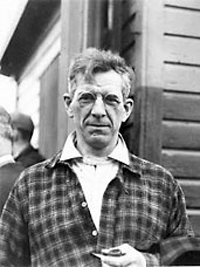A Quote by Benton MacKaye
My own doctrine of organization is that any body of people coming together for a purpose (whatever it may be) should consist of persons wholly wedded to said purpose and should consist of nobody else. If the purpose be Cannibalism (preference for Ham a la Capitalism) then nobody but a Cannibal should be admitted. There should be plenty of discussion and disagreement as to how and the means but none whatever as to ends.
Related Quotes
What does purpose mean? It means the deepest desire for our short lives to mean something. . . . To speak a language of purpose is to return to first principles and to be able to answer, in plain English, the plain questions of Why? Why should we chip in to help someone else? Why should we defer gratification? Why should we care about the long term? Why should we trust anyone who seems to be limiting our ability to do what we want?
The question that faces every man born into this world is not what should be his purpose, which he should set about to achieve, but just what to do with life? The answer, that he should order his life so that he can find the greatest happiness in it, is more a practical question, similar to that of how a man should spend his weekend, then a metaphysical proposition as to what is the mystic purpose of his life in the scheme of the universe.
What should our second generation have done, what should it do with the knowledge of the horrors of the extermination of the Jews? We should not believe we can comprehend the incomprehensible, we may not compare the incomparable, we may not inquire because to inquire is to make the horrors an object of discussion, even if the horrors themselves are not questioned, instead of accepting them as something in the face of which we can only fall silent in revulsion, shame and guilt. Should we only fall silent in revulsion, shame and guilt? To what purpose?
Whatever an education is, it should make you a unique individual, not a conformist; it should furnish you with an original spirit with which to tackle the big challenges. It should allow you to find values which will be your road map through life; it should make you spiritually rich, a person who loves whatever you are doing, wherever you are, whomever you are with; it should teach you what is important, how to live and how to die.
No matter what our job is, we view it not as our purpose in life but rather as where God has sovereignly placed us for the purpose of making Christ known and his name great. If you are a teacher, if you are a politician, if you are a businessman, if you are in agriculture, if you are in construction, if you are in technology, if you are in the arts, then you should not be saying, ‘I need to find my life’s purpose in this work,’ but rather, ‘I need to bring God’s purpose to this work.’
The object of a comedy is not to correct morals or ridicule the vices of society; no, a comedy should depict the discrepancies between life and purpose, should be the fruit of bitter indignation aroused by the degradation of human dignity, should be sarcasm, and not an epigram, convulsive laughter and not an amused grin, should be written with bile and not diluted salt, in a word, it should embrace life in its highest significance.
That education should be regulated by law and should be an affair of state is not to be denied, but what should be the character of this public education, and how young persons should be educated, are questions which remain to be considered. As things are, there is disagreement about the subjects. For mankind are by no means agreed about the things to be taught, whether we look to virtue or the best life. Neither is it clear whether education is more concerned with intellectual or with moral virtue.

































